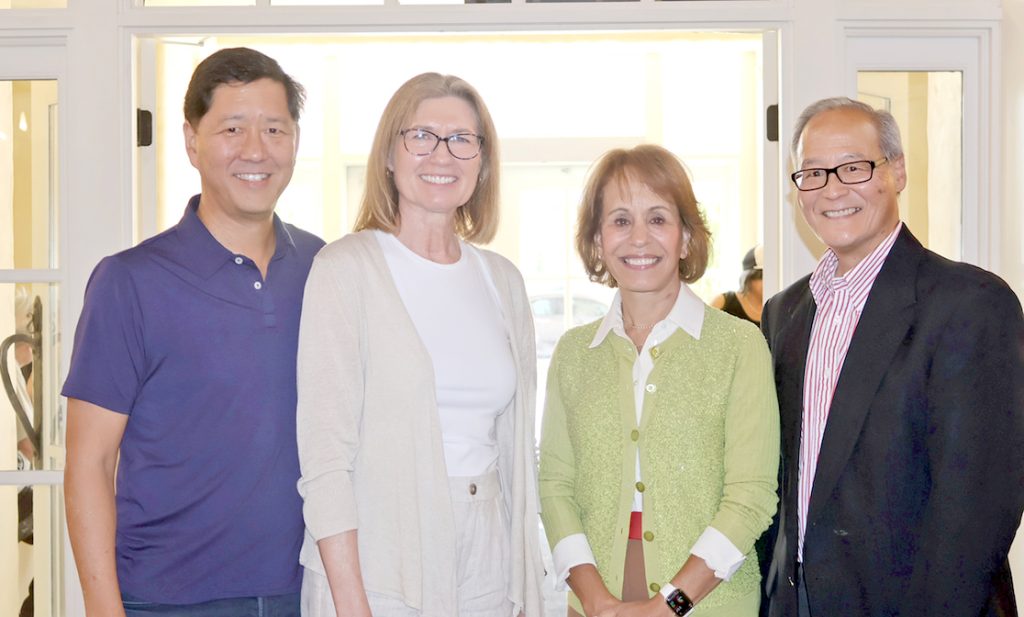
Mike and Lisa Kanazawa, who created the new Robert Emmett Fletcher Jr. Humanitarian Award, stand with former USC President Dr. Carol Folt and Glenn Osaki of the USC Annenberg School for Communication and Journalism following a short meeting with Pacific Citizen held July 19. (Photo: George Toshio Johnston)
Inaugural Robert Emmett Fletcher Jr. Award goes to USC’s Dr. Carol Folt.
By P.C. Staff
Do the right thing.
Not only can those four words be used for a movie title, they can encapsulate the essence behind the creation of a new JACL-sponsored honor, namely the Robert Emmett Fletcher Jr. Humanitarian Award, the first of which was presented during the JACL National Convention’s Sayonara Gala on July 19.
The “right thing” was what the award’s namesake, Robert E. Fletcher Jr., did for his neighbors when their government removed them from their farms and locked them up during World War II.
Decades later Dr. Carol Folt, the award’s first recipient, also did the right thing when she decided to break her university’s policy of never awarding honorary posthumous degrees, in this case to University of Southern California students of Japanese heritage, most of whom were U.S. citizens, who were summarily expelled after the United States and Japan went to war in late 1941.
After learning of the circumstances of the unfairness of how that cohort of students was treated, thanks in large part to the efforts of USC alumnus Jon Kaji, Folt realized that she not only had the authority to override her institution’s policy, she then took the steps necessary to make it happen and decades later finally do the right thing for those students and their descendants by awarding them in 2020 with honorary posthumous degrees from USC (see the April 15, 2020, Pacific Citizen, tinyurl.com/389sne6t).
Glenn Osaki of the USC Annenberg School for Communication and Journalism noted that Kaji and his late father, Bruce, had tried to persuade two previous presidents to do what Folt later did, but had declined.
Folt was honored by the JACL with the inaugural Robert Emmett Fletcher Jr. Humanitarian Award, creating a virtuous circle to recognize still-living people who went out of their way to do the right thing.
As for what Fletcher, who died in 2013 at 101, did and how the award came into being, another USC alumnus and his spouse come into play: Michael and Lisa Kanazawa.
Lisa Kanazawa is a great-niece of Fletcher, who selflessly and without fanfare stepped up to help three Japanese American neighbors — the Nitta, Okamoto and Tsukamoto families — by maintaining their farms while they were incarcerated during WWII.
According to the Los Angeles Times obituary, Fletcher “worked 90 acres of California table grapes, paid the mortgages and taxes, and took half the profits. He turned over the rest — along with the farms — to the three families when they returned to Sacramento in 1945.
“I did know a few of them pretty well and never agreed with the evacuation,” Fletcher told the Sacramento Bee in 2010.
After the war ended and formerly incarcerated Japanese American families began the resettlement phase, each had different circumstances awaiting them. Many had lost everything. But thanks to her relative’s efforts, Lisa Kanazawa said those three families whose returns were not so unfortunate. “When the families came back, they had a place to live,” she said. “Their homes were there for them, and they actually had some money to start. … a lot of the families did not come back to that kind of situation.”
Fletcher’s righteous actions resonated with Lisa and Mike and inspired them to approach the JACL National Board to create a new award to recognize the Bob Fletchers of the world.
Jumping to 2020 and how USC did the right thing under Folt’s leadership, she recalled how her decision played out. “Nobody said, ‘We don’t want it.’ In fact, when we wrote to people or called them, we didn’t say, ‘We’re going to do this.’ We said, ‘Would you accept the conferral of the degree?’ because it felt like it was their agency to do it.
“I just felt so privileged to be the person in this seat that could help that happen. But it was really about all of them and their families.”



